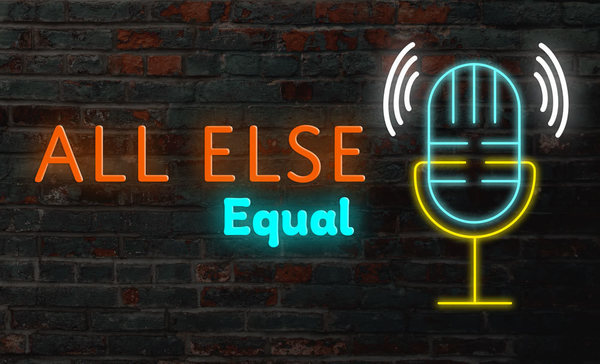
A bowl of candy in Jason Reed’s office sits uneaten — yet another reminder of how the coronavirus pandemic is reshaping the college experience.
Reed, an economist who teaches in the finance department at the University of Notre Dame’s Mendoza College of Business, laments the loss of opportunities to connect with students outside of the classroom. “Before COVID-19, students would regularly stop by and ask all kinds of questions related to economics, current events and life in general,” he said. “Running over to the Duncan Student Center to have coffee with students was a regular occurrence for me and my peers.”
Reed and Forrest Spence, a colleague in the economics department at the College of Arts and Letters, teamed up to reimagine how some of those informal conversations and idea exchanges could happen despite current physical distancing requirements. And so, their weekly podcast “All Else Equal” was born.

“Economists talk about a concept called ‘ceteris paribus.’ It’s a Latin phrase meaning ‘all else equal,’ Reed explained. “It’s a way that we are able to identify how one kind of change affects an overall system.”
The podcast centers around a current event question or observation from a student, who records the query in a voicemail message on Reed’s phone. He and Spence then invite a Notre Dame business or economics professor with expertise in that area to weigh in.
So far this semester, the podcast has tackled queries related to the pandemic and school reopenings, stay-at-home mandates, consumer behavior, the stock market and sports.
“The goal is to engage with students, but the topics, I think, are pertinent to anyone,” Reed said.
For instance, sophomore finance student Spencer Koehl questioned the mixed signals coming from Wall Street and Main Street economies. “I was wondering why we’re seeing all-time highs in the stock market while also seeing substantial GDP losses and rising unemployment,” he asked in the Aug. 22 episode. “It seems like something’s fundamentally disconnected, and I’d love to hear about what’s going on.”
To answer his question, Reed and Spence turned to Colin Jones, an associate teaching professor of finance at Mendoza.“I think these questions are really, really interesting and there’s a lot of ways to slice it,” said Jones, who unpacked the numbers Koehl referenced and discussed possible outcomes.
Reed and Spence aren’t afraid to be playful with their podcast. “Hopefully you’ll find these conversations as interesting as we do,” Spence quips in the opening of their first episode. “And if you don’t, just go listen to ‘Planet Money’ or something.”
They begin each episode with a music sample, which Reed says is a sort of “Easter egg” in that the title or a lyric in the song connects in some way to the topic. They also post both serious and light-hearted online extras, such as links to student clubs related to the discussion (Reed and Spence are co-advisors for the Notre Dame Federal Reserve and Fiscal Policy Challenge Club) or a link to video of marketing assistant professor and recent podcast guest Emily Garbinsky taking a pie in the face for a student fundraiser.
Student feedback has been positive and Reed says they’ve already had requests from students to be guests on the podcast and offer their perspectives as follow up to the discussion topics. He and Spence are working on creating some mini-episodes based on that concept. “I think that would be really fun,” he said.
“All Else Equal” can be heard at https://anchor.fm/allelseequal and on platforms including Spotify and Google Podcast.